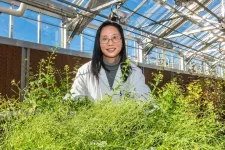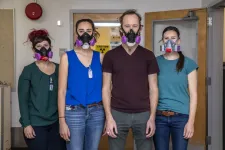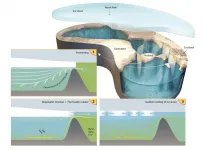The business of bees
The economic value of insect pollination services is much higher than previously thought in the US, new research finds
2021-02-03
(Press-News.org) The economic value of insect pollinators was $34 billion in the U.S. in 2012, much higher than previously thought, according to researchers at the University of Pittsburgh and Penn State University. The team also found that areas that are economically most reliant on insect pollinators are the same areas where pollinator habitat and forage quality are poor.
"Pollinators like bees play an extremely important role in agriculture," explained senior author Vikas Khanna, Wellington C. Carl Faculty Fellow and associate professor of civil and environmental engineering at Pitt's Swanson School of Engineering. "The insects that pollinate farmers' crops underpin our ecosystem biodiversity and function, human nutrition, and even economic welfare."
But some of those busy little bees are headed for crisis--one-third of managed honey bee colonies die each winter in the U.S., and populations of many wild pollinator species are showing declines as well.
Using publicly available price and production data and existing pollination field studies, the team determined economic dependence of U.S. crops on insect pollination services at the county level, as well as areas where the habitat for wild pollinators has been reduced. One key finding is that the economic value that is dependent on insect pollination totaled $34 billion in 2012, much higher than previously thought. The team looked at 2012 because it was the most recent year for which data were available.
"The value of insects as part of our economy is apparent when you look at the well-established connection between farming and beekeeping. Farmers sometimes will buy or rent bee colonies to help pollinate their crops when there aren't enough wild bees in the area," said Khanna. "We've found that some of the areas that are economically most reliant on insect pollinators are the same areas where pollinator habitat and forage quality are poor."
The researchers found that 20 percent of U.S. counties produce 80 percent of total economic value that can be attributed to wild and managed pollinators. Their findings will inform conservation efforts and ensure sustainable production of key crops.
They also identified the key areas that produce economically and nutritionally valuable crops and are highly dependent on pollinators--areas that are at risk if wild pollinator populations continue to decline. By overlaying maps of predicted wild bee abundance, the researchers could identify areas where there was high economic dependence on pollinators but low predicted abundance of pollinators.
The research suggests a need for farmers to mitigate the shrinking bee populations by providing a more suitable habitat for the insects to thrive.
"Our study showcases the increasing importance of pollinators to supporting U.S. agricultural systems, particularly for the foods that are vital for healthy diets, like fruits, vegetables and nuts," says Christina Grozinger, Publius Vergilius Maro Professor of Entomology and director of the Center for Pollinator Research at Penn State.
"This detailed map of pollination needs and pollinator deficits helps identify regions where resources could be provided to improve pollinator habitat, as well as other regions where local land use practices are supporting both agriculture and healthy pollinator populations. Those places could serve as models for sustainable agriculture and pollinator conservation practices."
INFORMATION:
The paper, "Economic Dependence and Vulnerability of United States Agricultural Sector on Insect-Mediated Pollination Service," (DOI: 10.1021/acs.est.0c04786) was published in the journal Environmental Science & Technology. Other authors on the paper include Alex Jordan, graduate student at Pitt, and Harland Patch, assistant research professor at Penn State.
The research was funded by the National Science Foundation.
[Attachments] See images for this press release:

ELSE PRESS RELEASES FROM THIS DATE:
2021-02-03
BOSTON - Although abnormal blood clotting has been identified as one of the primary causes of death from COVID-19, early treatment in an intensive care unit (ICU) with therapeutic anticoagulation (anti-clotting) for adults who are critically ill with COVID-19 does not appear to improve chances of survival, and could do more harm than good by increasing the risk for major bleeding, a multicenter research group cautions.
"In patients critically ill with COVID-19, therapeutic dose anticoagulation started early in the ICU stay was not associated with improved survival,"says Hanny Al-Samkari, MD, an investigator in the Division of Hematology/Oncology at Massachusetts General Hospital (MGH) and lead author ...
2021-02-03
Studies examining the effectiveness of treatments for COVID-19 often do not include the very populations hardest hit by the disease, according to a new review by University of Chicago Medicine researchers.
The findings, based on an analysis of all US COVID-19 treatment trials registered on ClinicalTrials.gov, were published Jan. 27 in the Journal of General Internal Medicine.
"This study highlights the blind spot in how clinical trials are done in the United States," said senior author Neda Laiteerapong, MD, MS, a general internist and associate director of the Center for Chronic Disease Research and Policy at the University of Chicago. "Researchers, hospitals and pharmaceutical ...
2021-02-03
UPTON, NY - Hundreds of naturally occurring specialty fatty acids (building blocks of oils) have potential for use as raw materials for making lubricants, plastics, pharmaceuticals, and more--if they could be produced at large scale by crop plants. But attempts to put genes for making these specialty building blocks into crops have had the opposite effect: Seeds from plants with genes added to make specialty fatty acids accumulated dramatically less oil. No one knew why.
Now two teams of biochemists working on separate aspects of oil synthesis at the U.S. Department of Energy's Brookhaven National Laboratory have converged to discover the mechanism behind the oil-production slowdown. As described in the journal Plant Physiology, they crossbred model plants and conducted detailed ...
2021-02-03
TAMPA, Fla. -- The prognosis of ovarian cancer is poor, with an estimated five-year survival of only 40% for advanced disease, the stage at which most ovarian carcinomas are diagnosed. These poor outcomes are partly due to the lack of effective therapies for advanced disease and recurrence. Immunotherapies hold promise for many types of cancer; however, studies have shown that patients with ovarian cancer do not have strong responses to existing drugs. In a new article published in Nature, Moffitt Cancer Center researchers demonstrate why some ...
2021-02-03
There is an impassioned debate taking place in medicine on whether race-based considerations should be a factor in research, diagnoses, or treatments. Those on one side assert that race should be ignored entirely because it is a societal construct with no biological basis, and accordingly many hospitals are abandoning long-established "race corrections" in medical algorithms and diagnostics. Others, like Meghan McGarry, MD, MS, assistant professor of pediatrics at UC San Francisco, say that we can't completely ignore race, precisely because science is rarely free of societal influence - the structural inequality ...
2021-02-03
Since element 99 - einsteinium - was discovered in 1952 at the Department of Energy's Lawrence Berkeley National Laboratory (Berkeley Lab) from the debris of the first hydrogen bomb, scientists have performed very few experiments with it because it is so hard to create and is exceptionally radioactive. A team of Berkeley Lab chemists has overcome these obstacles to report the first study characterizing some of its properties, opening the door to a better understanding of the remaining transuranic elements of the actinide series.
Published in the journal Nature, the study, "Structural and Spectroscopic Characterization of an Einsteinium Complex," was co-led by Berkeley Lab scientist Rebecca Abergel and Los ...
2021-02-03
The Arctic Ocean was covered by up to 900 m thick shelf ice and was filled entirely with freshwater at least twice in the last 150,000 years. This surprising finding, reported in the latest issue of the journal Nature, is the result of long-term research by scientists from the Alfred Wegener Institute and the MARUM. With a detailed analysis of the composition of marine deposits, the scientists could demonstrate that the Arctic Ocean as well as the Nordic Seas did not contain sea-salt in at least two glacial periods. Instead, these oceans were filled with large amounts of freshwater under a thick ice shield. This water could then be released into the North Atlantic in very short periods of time. Such sudden freshwater inputs could explain rapid climate oscillations for which no satisfying ...
2021-02-03
What The Study Did: Data from the Centers for Disease Control and Prevention were used to look at changes in emergency department visits for mental health, suicide attempts, drug and opioid overdoses and outcomes of violence before and during the COVID-19 pandemic.
Authors: Kristin M. Holland, Ph.D., M.P.H., of the Centers for Disease Control and Prevention in Atlanta, is the corresponding author.
To access the embargoed study: Visit our For The Media website at this link https://media.jamanetwork.com/
(10.1001/jamapsychiatry.2020.4402)
Editor's Note: Please see the article for additional information, ...
2021-02-03
What The Study Did: COVID-19 outcomes including hospitalization and in-hospital death were compared between people living with or without diagnosed HIV in New York State.
Authors: Eli S. Rosenberg, Ph.D., of the State University of New York in Rensselaer, is the corresponding author.
To access the embargoed study: Visit our For The Media website at this link https://media.jamanetwork.com/
(doi:10.1001/jamanetworkopen.2020.37069)
Editor's Note: The article includes conflict of interest and funding/support disclosures. Please see the article for additional information, including other authors, author contributions and ...
2021-02-03
Mechanism for control of antibiotic production in soil bacteria is visualised for the first time by scientists at University of Warwick and Monash University
Research reported in Nature could lead to improved manufacturing of existing antibiotics, and open up opportunities to discover new ones
The majority of clinically used antibiotics are derived from soil bacteria, but can be hard to find because their production is switched off in laboratory cultures
The discovery of how hormone-like molecules turn on antibiotic production in soil bacteria could unlock the untapped opportunities for medicines that are under our very feet.
An international team of scientists working at the University of Warwick, UK, and Monash ...
LAST 30 PRESS RELEASES:
[Press-News.org] The business of bees
The economic value of insect pollination services is much higher than previously thought in the US, new research finds




